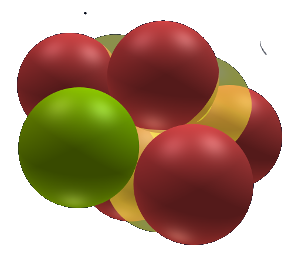Silicon 28
Silicon has an acitve carbon nuclet which results in a valence of +2/+4 and is essentially a Carbon with an extra backbone that has a neutral 5 ending. The half with the 5 ending is as if it were a noble gas, the half that has the Carbon nuclet is as if it were a Carbon. Therefore it falls into the so called Carbon group with similar properties as Carbon.
The Carbon nuclet can hold 2 potential extra 'neutrons' (p+e pair) yielding the Si 29 and Si 30 isotopes that are still stable.
nb. Silicon has an alternative form, see element "Silicon 28 Alternative".
Which combination of nuclets is dependent on the ratio of protons and neutrons (Deuterium pairs).
In this case of Silicon, it seems that the alternative form is more true.
| Element | |
| Valence | *4, 3, 2, 1, -1, -2, *-4 |
| Stability |
|
| Isotope | |
| Abundance |
92.22 %
|
| Half Life |
Stable
|
| Decay | |
| Protons |
28
|
| Inner Electrons |
14
|
| Outer Electrons |
14
|
| Nuclear Spin |
0+
|
| Mass Actual |
27.9769 AMU
|
| Mass H Norm |
27.7597 AMU
|
| Mass Calc |
28.2191 AMU
|
| BE Nucleon |
8447.74 KeV
|
| BE Actual |
236.54 MeV
|
| SAM Lines |
106.00
|
| BE SAM Lines |
235.85 MeV
|
| BE Difference |
99.71%
|
| AN-ISOTOPE |
14: 28
|
| Nid | 291 |
state: final
protons:
P0:
P1:
P2:
P3:
P4:
P5:
P6:
P7:
P8:
P9:
P10:
P11:
P12:
P13:
P14:
P15:
neutrons: [U00]
electrons:
E01: {protons: [P9, P0]}
E02: {protons: [P7, P11]}
E03: {protons: [P1, P4]}
E04: {protons: [P10, P3]}
E05: {protons: [P6, P2]}
E06: {protons: [P8, P5]}
E07: {protons: [P15, P14]}
E08: {protons: [P13, P12]}
nuclets:
N01:
state: carbon
attachAngle: 3
protons:
P0:
P1:
P2:
P3:
P4:
P5:
P6:
P7:
P8:
P9: {color: proton}
P11:
electrons:
E01: {protons: [P3, P11]}
E02: {protons: [P1, P4]}
E03: {protons: [P6, P2]}
E04: {protons: [P7, P0]}
E05: {protons: [P8, P5]}
